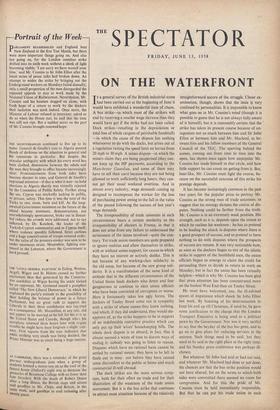—Portrait of the Week— P ARLIAMENT REASSEMBLED and England beat New
Zealand in the first Test Match, but there were more important things going on. And also not going on, for the London omnibus strike drifted into its sixth week without a chink of light becoming visible. 'I am sorry we have wasted your time,' said Mr. Cousins to Sir John Elliot after the latest series of peace talks had broken down, An attempt to widen the strike by bringing out the Underground workers on Mondays failed dismally; only a small proportion of the men disregarded the repeated appeals to stay at work made by the National Union of Railwaymen. Nevertheless, Mr. Cousins and his busmen slogged on alone, with fresh hope of a return to work by the dockers their isolation was stark indeed. Once more, the Minister of Labour refused to intervene; asked to do so when the House met, he said that the time was still not ripe. But a sudden move on the part of Mr. Cousins brought renewed hope.
THE MEDITERRANEAN continued to live up to its name. General de Gaulle's visit to Algeria poured floods of darkness on the situation in general and his intentions in particular. But despite the oracular ambiguity with which his every word has been clothed, dissensions between the rebels and the man they brought to office became increasingly clear. Pronouncements from both sides have become sharper in tone, and General de Gaulle's expressed intention—if that is what it was—to hold elections in Algeria shortly was virtually rejected by the Committee of Public Safety. Farther along the sea, Cyprus was markedly lacking in public, or private, safety. This time it was the turn of the Turks to riot, stone, burn and kill. As the long- awaited Government statement on the future of the island became imminent, demonstrations, not overwhelmingly spontaneous, broke out in Instan- bul (where the crowds were addressed, not to say inflamed, by Dr. Kutchuk, the leader of the Turkish-Cypriot community) and in Cyprus itself, where violence speedily followed. Strict curfews and a huge concentration of troops restored order, but the valve of the pressure-cooker was seen to be under enormous strain. Meanwhile, fighting con- tinued in the Lebanon, where the Government is hard pressed.
THE 'LITTLE GENERAL ELECTION' in Ealing, Weston, Argyll, Wigan and St. Helens caused no further excitement than that generated by the Conserva- tive candidate at Wigan having his ankle kicked by an opponent., Mr. Grimond issued a pamphlet called 'The New Liberal Democracy,' in which he explained his party's attitude to the possibility of their holding the balance of power in a future Parliament, but no great rush to support the 'Liberals in their three candidacies was repprted as a consequence. Mr. Macmillan, at any rate. did not appear to be worried as he left for his vi it to the United States and Canada, though when his aeroplane returned three hours later with engine trouble he might have been forgiven a slight testi- ness. First reports from his tour indicated that while nothing very much was being decided, the Prime Minister was as usual being a huge success.
*
AT CAMBRIDGE, there was a reminder of the great pre-war undergraduate jests when a group of students hoisted a motor-van on to the roof of the Senate house (Oxford's reply was to decorate the pinnacles of Brasenose College with no fewer than four bicycles). With the death of Robert Donat after a long illness, the British stage and screen said goodbye to Mr. Chips, and Britain, in the same week, said goodbye to coal rationing after twenty years,


































 Previous page
Previous page